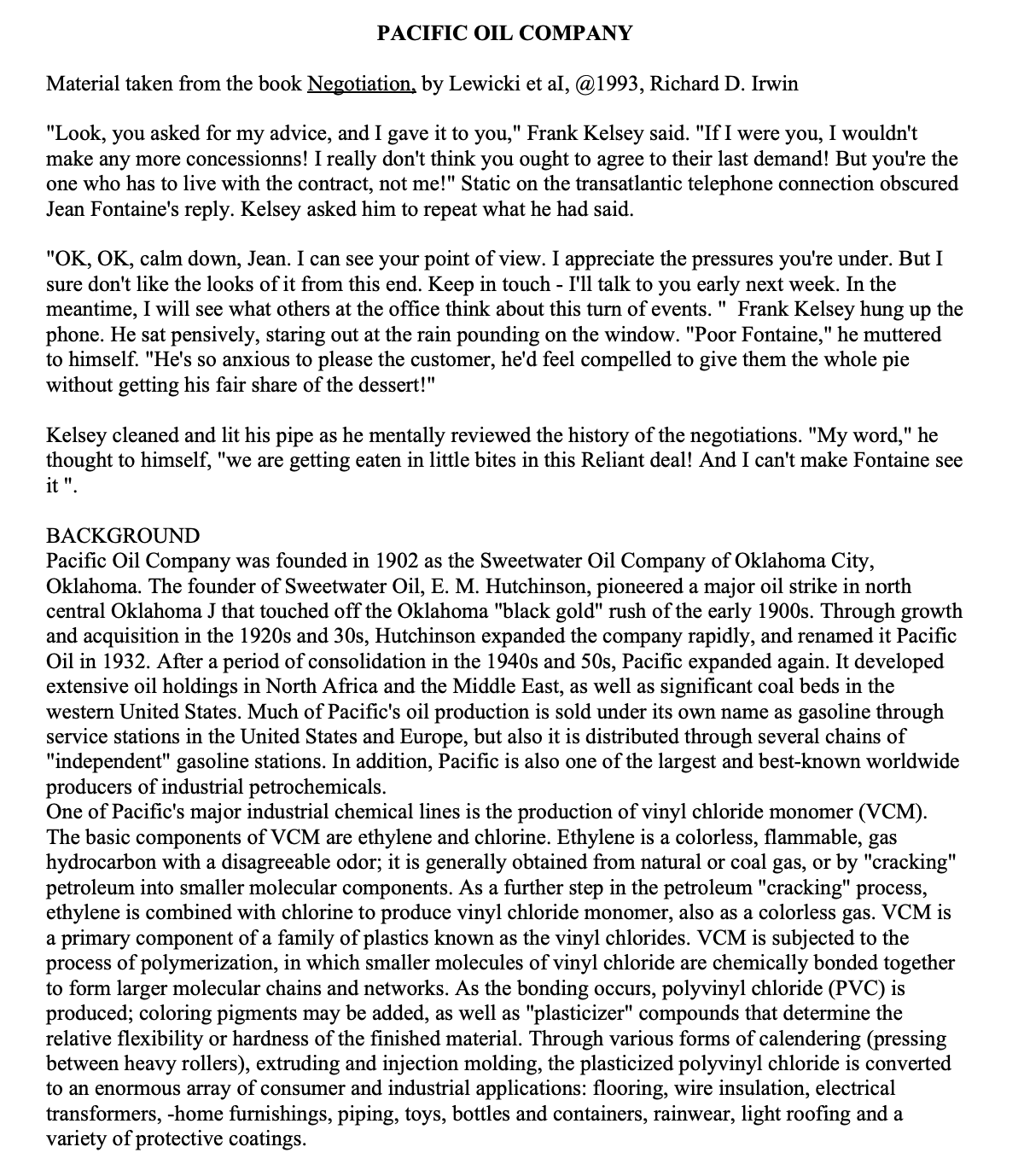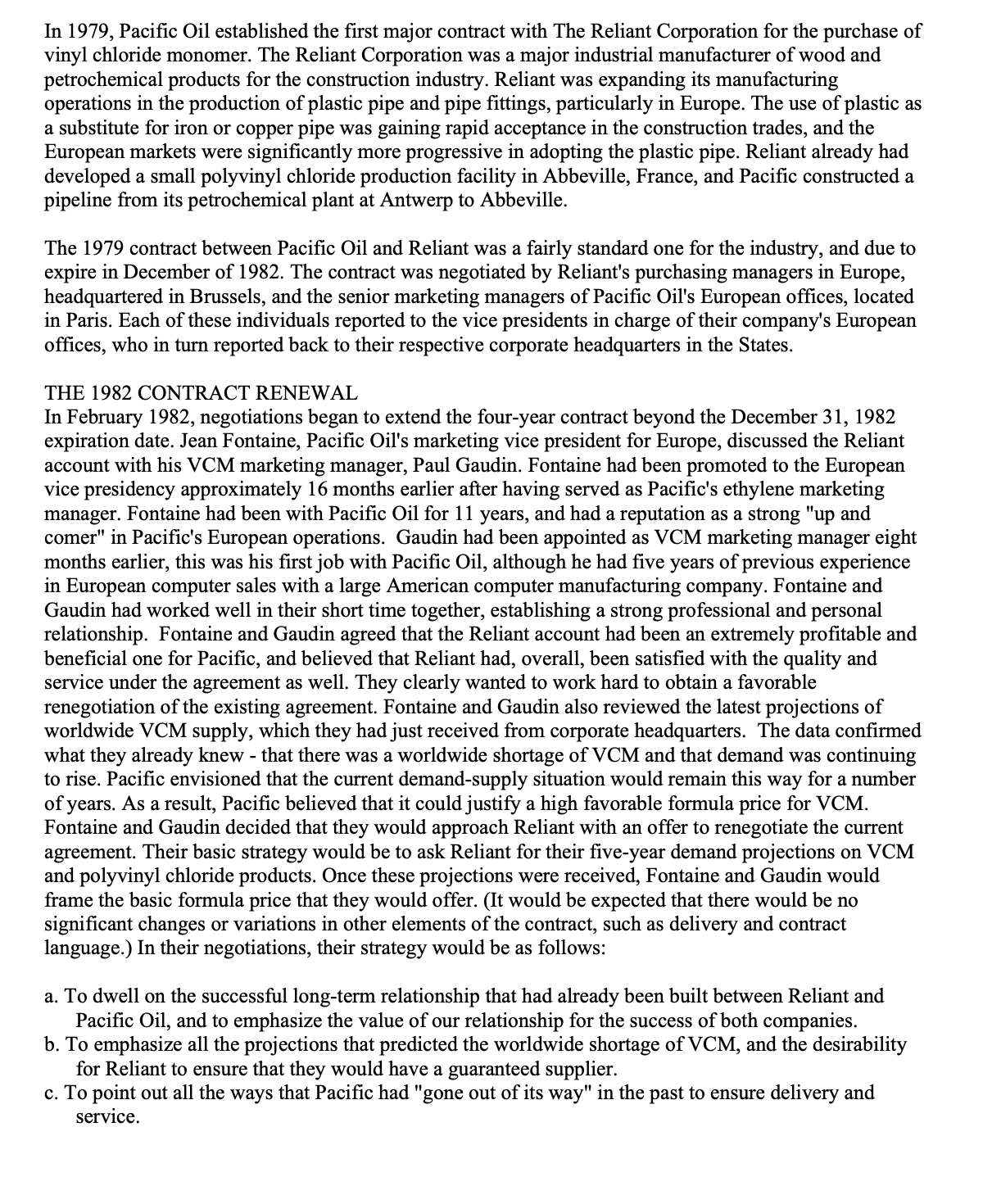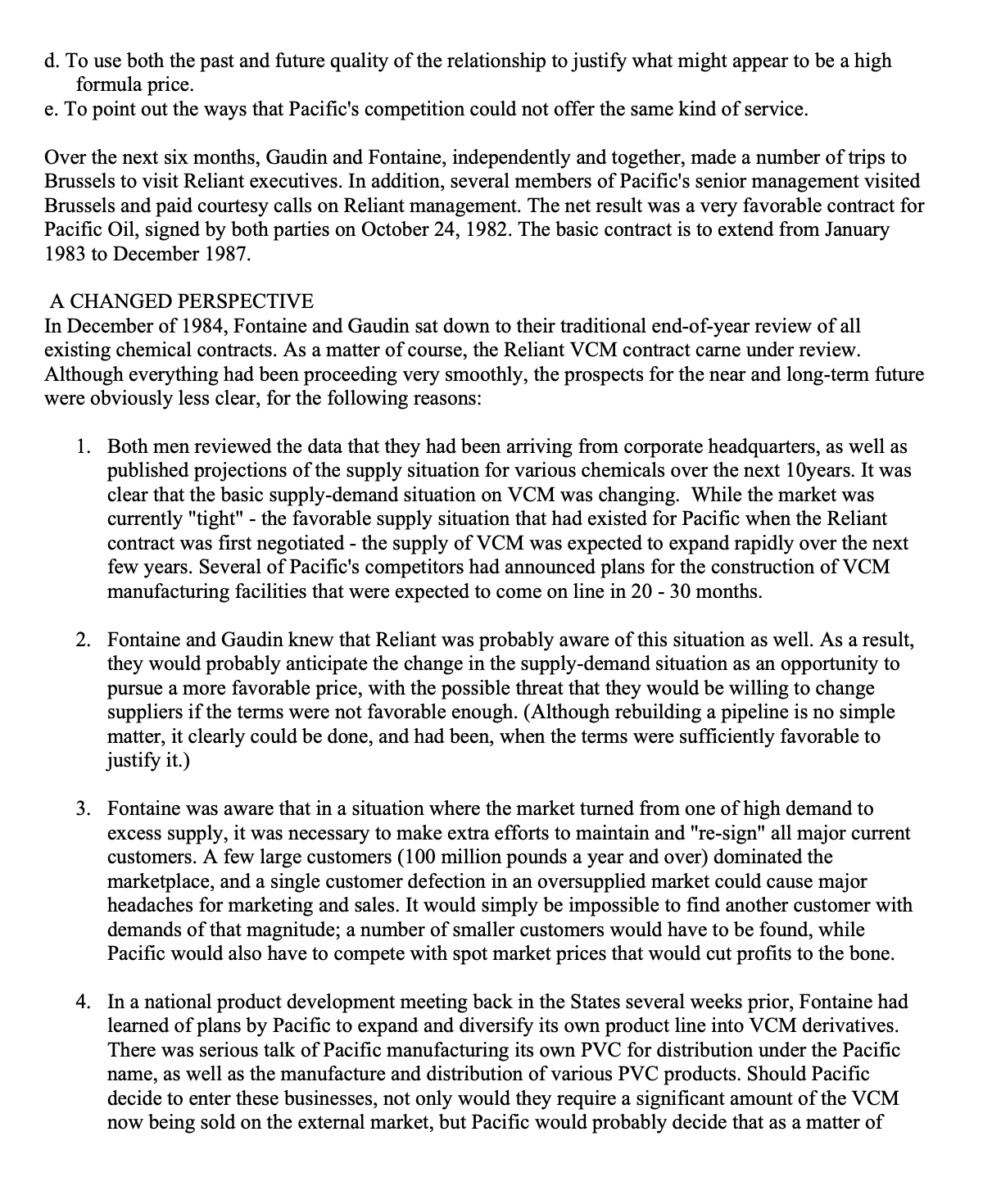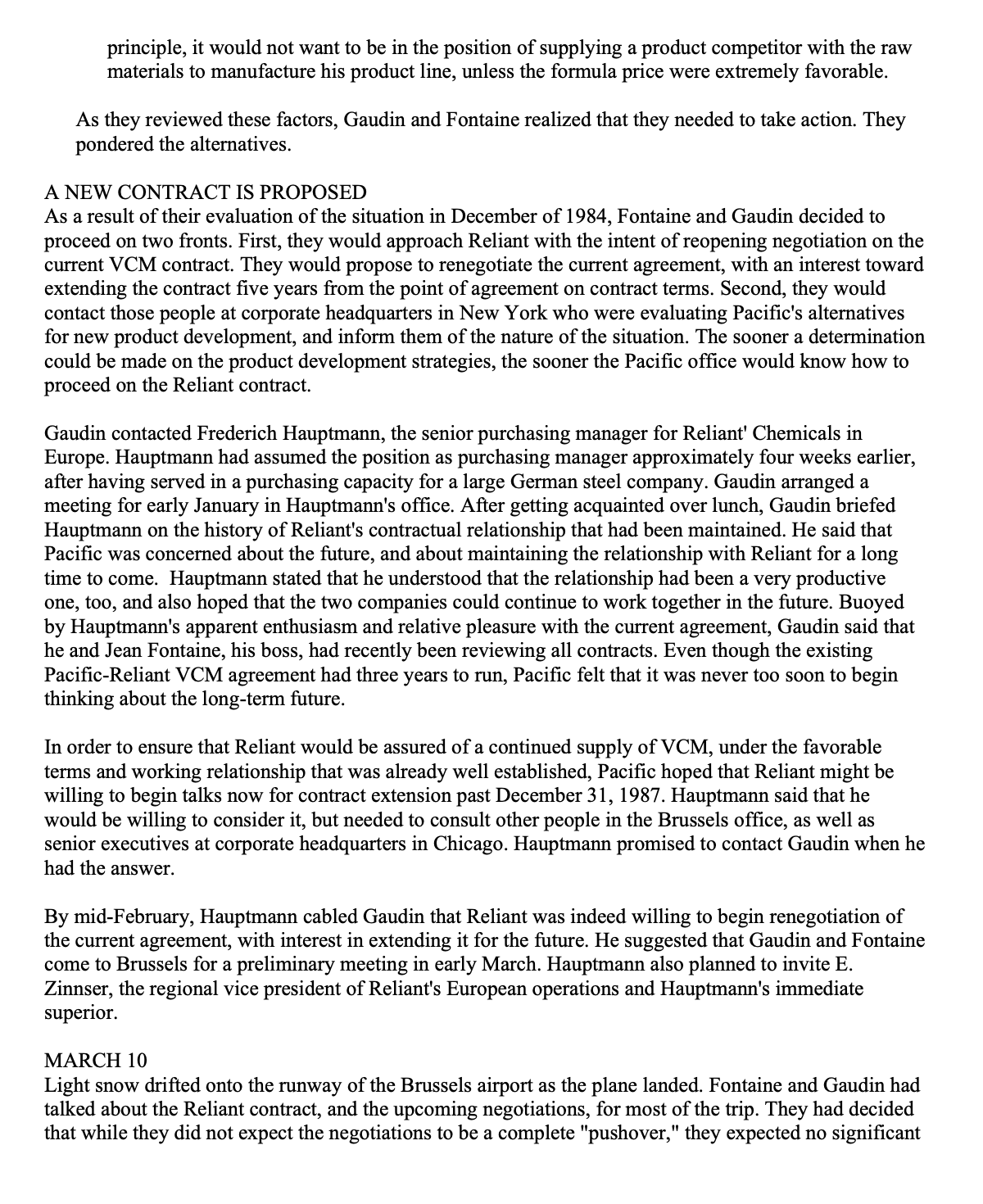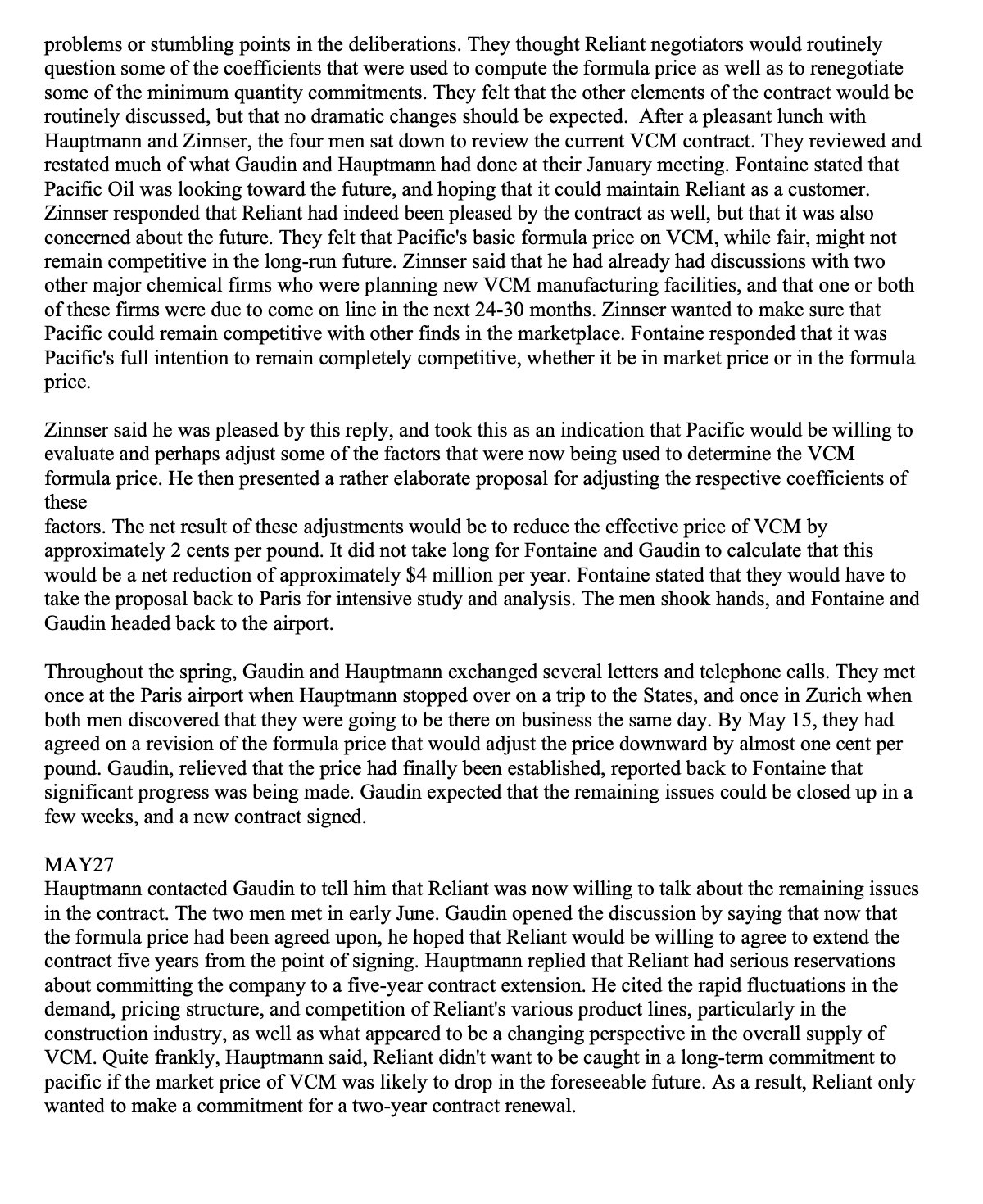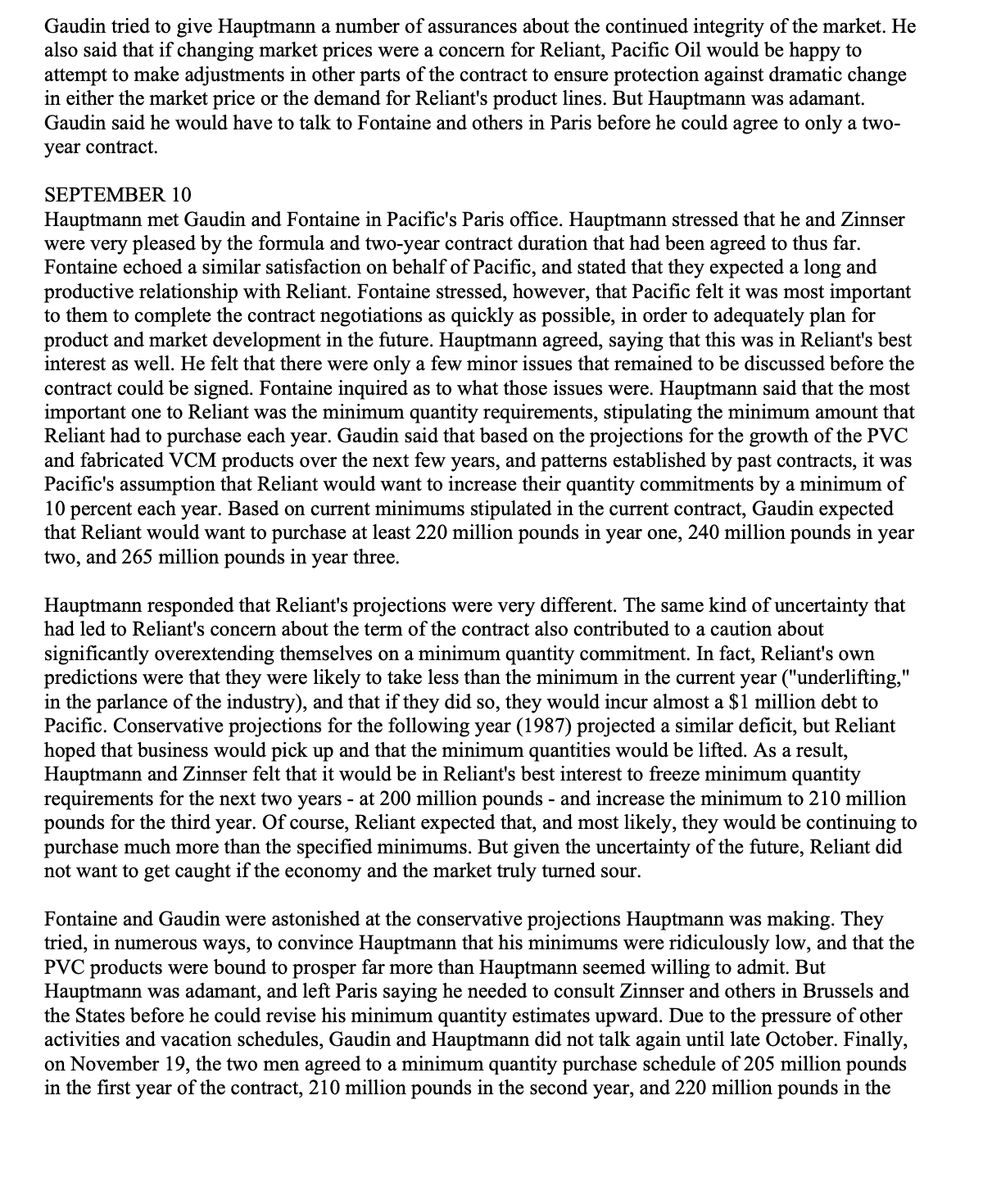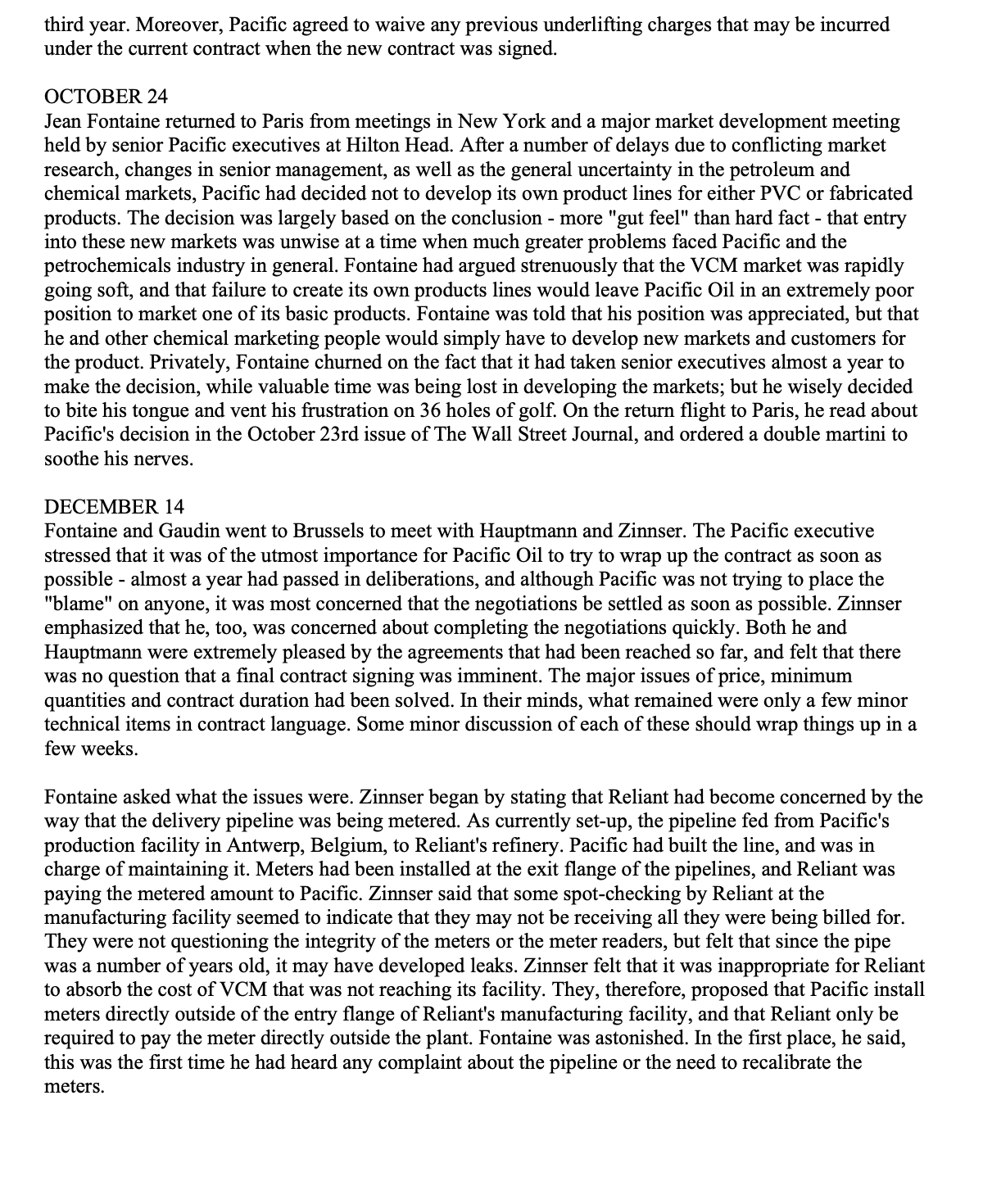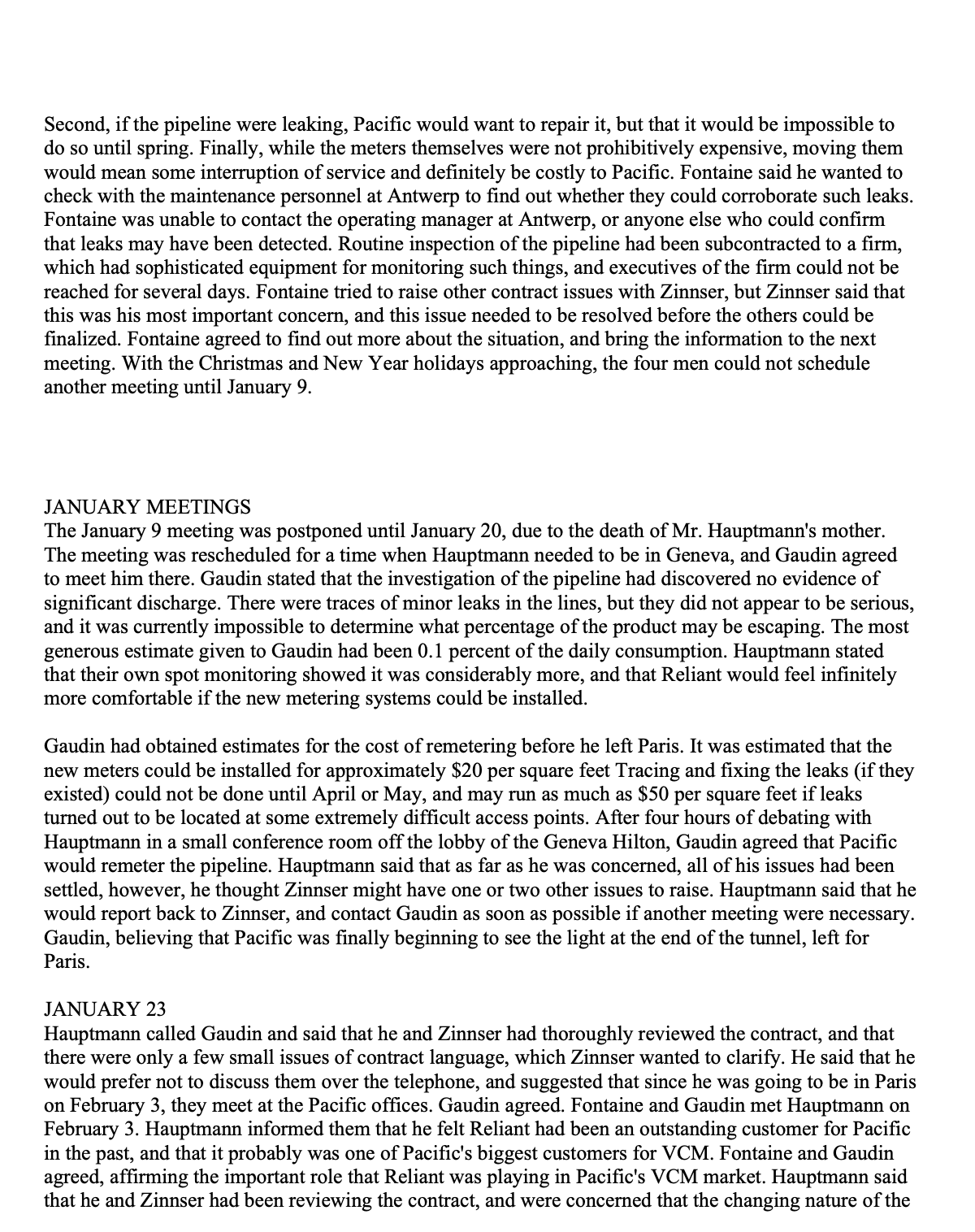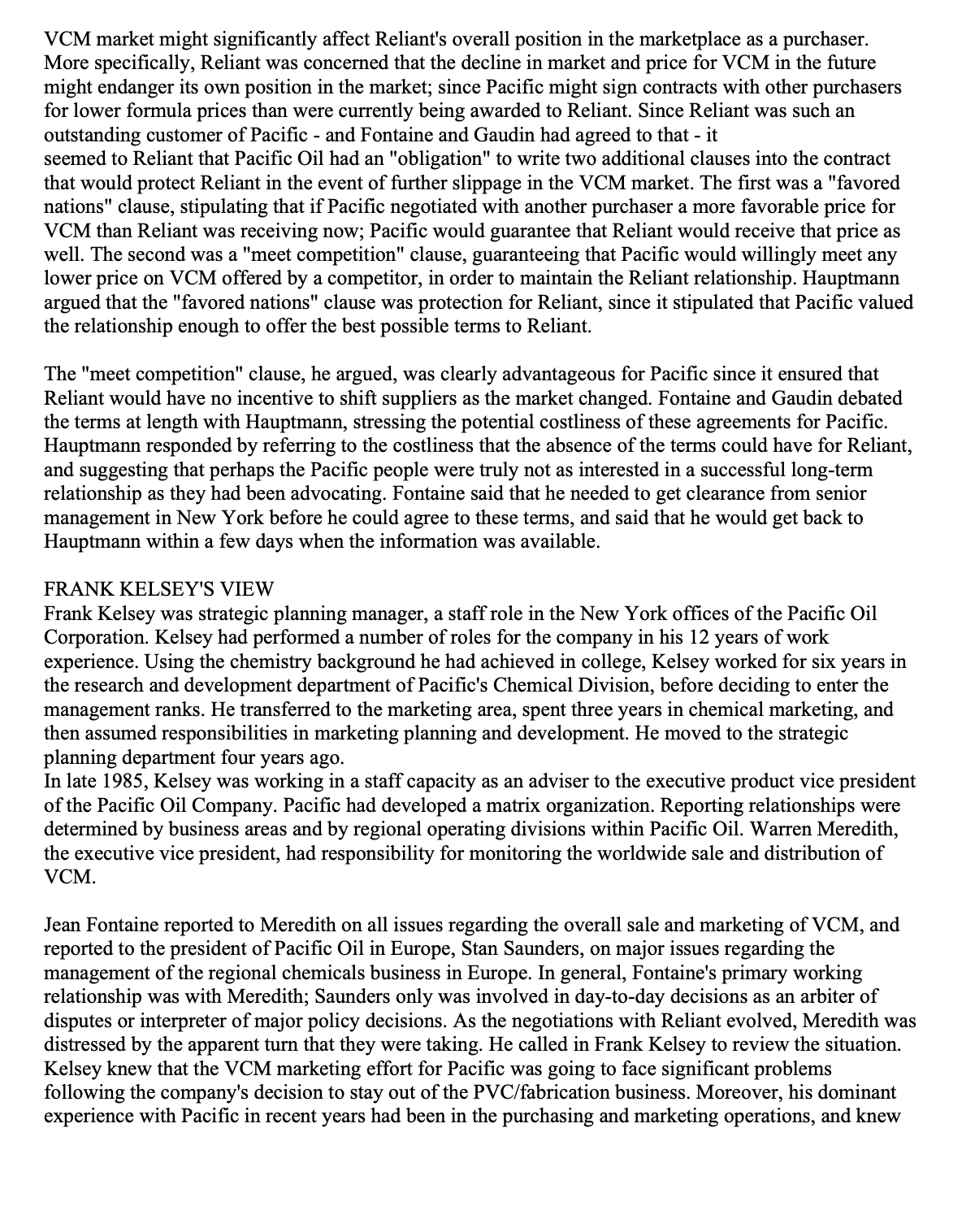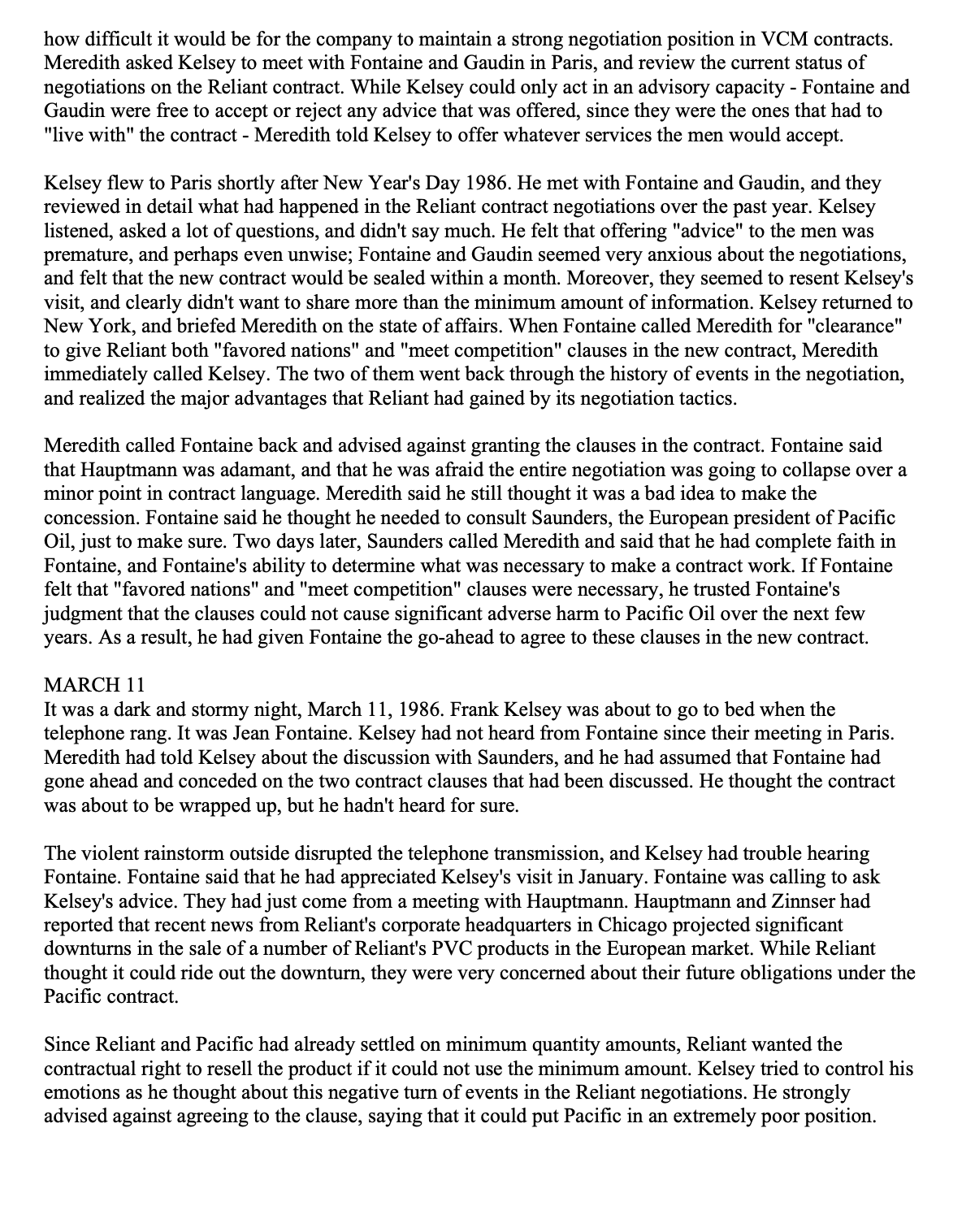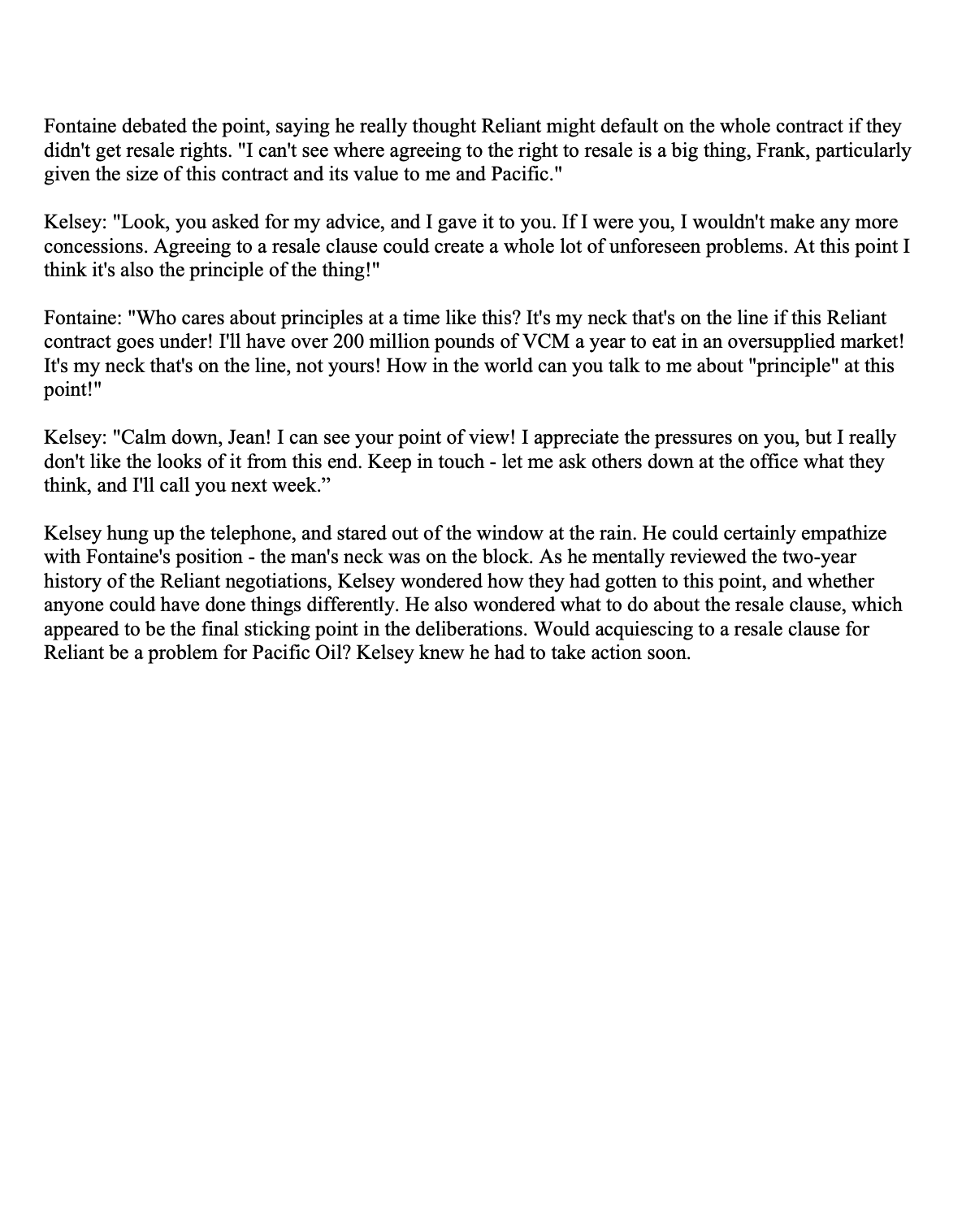Read the Pacific Oil Case below and consider the following questions below:
- Identify the strengths and weaknesses of Fontaine's and Gaudin 's negotiating strategy in their deliberations with Reliant Chemical Company.
- Identify the strengths and weaknesses of Hauftman's and Zinnser's negotiating strategy.
Note: Refer to the pg.# and try to make a well structure written response USING YOUR OWN WORDS, PLEASE. thank you
PACIFIC OIL COMPANY Material taken from the book Neggtiatign, by Lewicki et a1, @1993, Richard D. Irwin "Look, you asked for my advice, and I gave it to you, " Frank Kelsey said. "IfI were you, I wouldn't make any more concessionns! I really don't think you ought to agree to their last demand! But you're the one Who has to live with the contract, not me! " Static on the transatlantic telephone connection obscured Jean Fontaine's reply. Kelsey asked him to repeat what he had said. "OK, OK, calm down, Jean. I can see your point of view. I appreciate the pressures you're under. But I sure don't like the looks of it from this end. Keep in touch I'll talk to you early next week. In the meantime, I will see what others at the ofce think about this turn of events. " Frank Kelsey hung up the phone. He sat pensively, staring out at the rain pounding on the window. "Poor Fontaine," he muttered to himself. "He's so anxious to please the customer, he'd feel compelled to give them the whole pie without getting his fair share of the dessert!" Kelsey cleaned and lit his pipe as he mentally reviewed the history of the negotiations. "My word," he thought to himself, "we are getting eaten in little bites in this Reliant deal! And I can't make Fontaine see it ". BACKGROUND Pacic Oil Company was founded in 1902 as the Sweetwater Oil Company of Oklahoma City, Oklahoma. The founder of Sweetwater Oil, E. M. Hutchinson, pioneered a major oil strike in north central Oklahoma J that touched off the Oklahoma "black gold" rush of the early 1900s. Through growth and acquisition in the 19205 and 305, Hutchinson expanded the company rapidly, and renamed it Pacic Oil in 1932. After a period of consolidation in the 1940s and 50s, Pacic expanded again. It developed extensive oil holdings in North Africa and the Middle East, as well as signicant coal beds in the western United States. Much of Pacic's oil production is sold under its own name as gasoline through service stations in the United States and Europe, but also it is distributed through several chains of "independent" gasoline stations. In addition, Pacic is also one of the largest and best-known worldwide producers of industrial petrochemicals. One of Pacic's major industrial chemical lines is the production of vinyl chloride monomer (V CM). The basic components of VCM are ethylene and chlorine. Ethylene is a colorless, ammable, gas hydrocarbon with a disagreeable odor; it is generally obtained 'om natural or coal gas, or by "cracking" petroleum into smaller molecular components. As a further step in the petroleum "cracking" process, ethylene is combined with chlorine to produce vinyl chloride monomer, also as a colorless gas. VCM is a primary component of a family of plastics known as the vinyl chlorides. VCM is subjected to the process of polymerization, in which smaller molecules of vinyl chloride are chemically bonded together to form larger molecular chains and networks. As the bonding occurs, polyvinyl chloride (PVC) is produced; coloring pigments may be added, as well as "plasticizer" compounds that determine the relative exibility or hardness of the nished material. Through various forms of calendeIing (pressing between heavy rollers), extruding and injection molding, the plasticized polyvinyl chloride 15 converted to an enormous array of consumer and industrial applications: ooring, wire insulation, electrical transformers, -home furnishings, piping, toys, bottles and containers, rainwear, light roong and a variety of protective coatings. In 1979, Pacific Oil established the first major contract with The Reliant Corporation for the purchase of vinyl chloride monomer. The Reliant Corporation was a major industrial manufacturer of wood and petrochemical products for the construction industry. Reliant was expanding its manufacturing operations in the production of plastic pipe and pipe fittings, particularly in Europe. The use of plastic as a substitute for iron or copper pipe was gaining rapid acceptance in the construction trades, and the European markets were significantly more progressive in adopting the plastic pipe. Reliant already had developed a small polyvinyl chloride production facility in Abbeville, France, and Pacific constructed a pipeline from its petrochemical plant at Antwerp to Abbeville. The 1979 contract between Pacific Oil and Reliant was a fairly standard one for the industry, and due to expire in December of 1982. The contract was negotiated by Reliant's purchasing managers in Europe, headquartered in Brussels, and the senior marketing managers of Pacific Oil's European offices, located in Paris. Each of these individuals reported to the vice presidents in charge of their company's European offices, who in turn reported back to their respective corporate headquarters in the States THE 1982 CONTRACT RENEWAL In February 1982, negotiations began to extend the four-year contract beyond the December 31, 1982 expiration date. Jean Fontaine, Pacific Oil's marketing vice president for Europe, discussed the Reliant account with his VCM marketing manager, Paul Gaudin. Fontaine had been promoted to the European vice presidency approximately 16 months earlier after having served as Pacific's ethylene marketing manager. Fontaine had been with Pacific Oil for 11 years, and had a reputation as a strong "up and comer" in Pacific's European operations. Gaudin had been appointed as VCM marketing manager eight months earlier, this was his first job with Pacific Oil, although he had five years of previous experience in European computer sales with a large American computer manufacturing company. Fontaine and Gaudin had worked well in their short time together, establishing a strong professional and personal relationship. Fontaine and Gaudin agreed that the Reliant account had been an extremely profitable and beneficial one for Pacific, and believed that Reliant had, overall, been satisfied with the quality and service under the agreement as well. They clearly wanted to work hard to obtain a favorable renegotiation of the existing agreement. Fontaine and Gaudin also reviewed the latest projections of worldwide VCM supply, which they had just received from corporate headquarters. The data confirmed what they already knew - that there was a worldwide shortage of VCM and that demand was continuing to rise. Pacific envisioned that the current demand-supply situation would remain this way for a number of years. As a result, Pacific believed that it could justify a high favorable formula price for VCM. Fontaine and Gaudin decided that they would approach Reliant with an offer to renegotiate the current agreement. Their basic strategy would be to ask Reliant for their five-year demand projections on VCM and polyvinyl chloride products. Once these projections were received, Fontaine and Gaudin would frame the basic formula price that they would offer. (It would be expected that there would be no significant changes or variations in other elements of the contract, such as delivery and contract language.) In their negotiations, their strategy would be as follows: a. To dwell on the successful long-term relationship that had already been built between Reliant and Pacific Oil, and to emphasize the value of our relationship for the success of both companies. b. To emphasize all the projections that predicted the worldwide shortage of VCM, and the desirability for Reliant to ensure that they would have a guaranteed supplier. c. To point out all the ways that Pacific had "gone out of its way" in the past to ensure delivery and service.d. To use both the past and future quality of the relationship to justify what might appear to be a high formula price. e. To point out the ways that Pacic's competition could not offer the same kind of service. Over the next six months, Gaudin and Fontaine, independently and together, made a number of trips to Brussels to visit Reliant executives. In addition, several members of Pacic's senior management visited Brussels and paid courtesy calls on Reliant management. The net result was a very favorable contract for Pacic Oil, signed by both parties on October 24, 1982. The basic contract is to extend from January 1983 to December 1987. A CHANGED PERSPECTIVE In December of 1984, Fontaine and Gaudin sat down to their traditional end-of-year review of all existing chemical contracts. As a matter of course, the Reliant VCM contract came under review. Although everything had been proceeding very smoothly, the prospects for the near and longterm future were obviously less clear, for the following reasons: 1. Both men reviewed the data that they had been arriving from corporate headquarters, as well as published projections of the supply situation for various chemicals over the next 10years. It was clear that the basic supplydemand situation on VCM was changing. While the market was currently "tight" - the favorable supply situation that had existed for Pacic when the Reliant contract was rst negotiated - the supply of VCM was expected to expand rapidly over the next few years. Several of Pacic's competitors had announced plans for the construction of VCM manufacturing facilities that were expected to come on line in 20 - 30 months. 2. Fontaine and Gaudin knew that Reliant was probably aware of this situation as well. As a result, they would probably anticipate the change in the supplydemand situation as an opportunity to pursue a more favorable price, with the possible threat that they would be willing to change suppliers if the terms were not favorable enough. (Although rebuilding a pipeline is no simple matter, it clearly could be done, and had been, when the terms were sufciently favorable to justify it.) 3. Fontaine was aware that in a situation where the market turned from one of high demand to excess supply, it was necessary to make extra efforts to maintain and "re-sign" all major current customers. A few large customers (100 million pounds a year and over) dominated the marketplace, and a single customer defection in an oversupplied market could cause major headaches for marketing and sales. It would simply be impossible to nd another customer with demands of that magnitude; a number of smaller customers would have to be found, while Pacic would also have to compete with spot market prices that would cut prots to the bone. 4. In a national product development meeting back in the States several weeks prior, Fontaine had learned of plans by Pacic to expand and diversify its own product line into VCM derivatives. There was serious talk of Pacic manufacturing its own PVC for distribution under the Pacic name, as well as the manufacture and distribution of various PVC products. Should Pacic decide to enter these businesses, not only would they require a signicant amount of the VCM now being sold on the external market, but Pacic would probably decide that as a matter of principle, it would not want to be in the position of supplying a product competitor with the raw materials to manufacture his product line, unless the formula price were extremely favorable. As they reviewed these factors, Gaudin and Fontaine realized that they needed to take action They pondered the alternatives. A NEW CONTRACT IS PROPOSED As a result of their evaluation of the situation in December of 1984, Fontaine and Gaudin decided to proceed on two fronts. First, they would approach Reliant with the intent of reopening negotiation on the current VCM contract. They would propose to renegotiate the current agreement, with an interest toward extending the contract ve years 'om the point of agreement on contract terms. Second, they would contact those people at corporate headquarters in New York who were evaluating Pacic's alternatives for new product development, and inform them of the nature of the situation. The sooner a determination could be made on the product development strategies, the sooner the Pacic ofce would know how to proceed on the Reliant contract. Gaudin contacted Frederich Hauptmann, the senior purchasing manager for Reliant' Chemicals in Europe. Hauptmann had assumed the position as purchasing manager approximately four weeks earlier, aer having served in a purchasing capacity for a large German steel company. Gaudin arranged a meeting for early January in Hauptmann's ofce. Aer getting acquainted over lunch, Gaudin briefed Hauptmann on the history of Reliant's contractual relationship that had been maintained. He said that Pacic was concerned about the future, and about maintaining the relationship with Reliant for a long time to come. Hauptmann stated that he understood that the relationship had been a very productive one, too, and also hoped that the two companies could continue to work together in the future. Buoyed by Hauptmann's apparent enthusiasm and relative pleasure with the current agreement, Gaudin said that he and Jean Fontaine, his boss, had recently been reviewmg all contracts. Even though the existing Pacic-Reliant VCM agreement had three years to run, Pacic felt that it was never too soon to begin thinking about the long-term future. In order to ensure that Reliant would be assured of a continued supply of VCM, under the favorable terms and working relationship that was already well established, Pacic hoped that Reliant might be willing to begin talks now for contract extension past December 31, 1987. Hauptmann said that he would be willing to consider it, but needed to consult other people in the Brussels ofce, as well as senior executives at corporate headquarters in Chicago. Hauptmann promised to contact Gaudin when he had the answer. By midFebruary, Hauptmann cabled Gaudin that Reliant was indeed willing to begin renegotiation of the current agreement, with interest in extending it for the future. He suggested that Gaudin and Fontaine come to Brussels for a preliminary meeting in early March. Hauptmann also planned to invite E. Zinnser, the regional vice president of Reliant's European operations and Hauptmann's immediate superior. MARCH 10 Light snow drifted onto the runway of the Brussels airport as the plane landed. Fontaine and Gaudin had talked about the Reliant contract, and the upcoming negotiations, for most of the trip. They had decided that while they did not expect the negotiations to be a complete "pushover," they expected no signicant problems or stumbling points in the deliberations. They thought Reliant negotiators would routinely question some of the coefcients that were used to compute the formula price as well as to renegotiate some of the minimum quantity commitments. They felt that the other elements of the contract would be routinely discussed, but that no dramatic changes should be expected. Aer a pleasant lunch with Hauptmann and Zinnser, the four men sat down to review the current VCM contract. They reviewed and restated much of what Gaudin and Hauptmann had done at their January meeting. Fontaine stated that Pacic Oil was looking toward the future, and hoping that it could maintain Reliant as a customer. Zinnser responded that Reliant had indeed been pleased by the contract as well, but that it was also concerned about the future. They felt that Pacic's basic formula price on VCM, while fair, might not remain competitive in the longrun future. Zinnser said that he had already had discussions with two other major chemical rms who were planning new VCM manufacturing facilities, and that one or both of these rms were due to come on line in the next 24-30 months. Zinnser wanted to make sure that Pacic could remain competitive with other nds in the marketplace. Fontaine responded that it was Pacic's full intention to remain completely competitive, whether it be in market price or in the formula price. Zinnser said he was pleased by this reply, and took this as an indication that Pacic would be willing to evaluate and perhaps adjust some of the factors that were now being used to determine the VCM formula price. He then presented a rather elaborate proposal for adjusting the respective coefcients of these factors. The net result of these adjustments would be to reduce the effective price of VCM by approximately 2 cents per pound. It did not take long for Fontaine and Gaudin to calculate that this would be a net reduction of approximately $4 million per year. Fontaine stated that they would have to take the proposal back to Paris for intensive study and analysis. The men shook hands, and Fontaine and Gaudin headed back to the airport. Throughout the spring, Gaudin and Hauptmann exchanged several letters and telephone calls. They met once at the Paris airport when Hauptmann stopped over on a trip to the States, and once in Zurich when both men discovered that they were going to be there on business the same day. By May 15, they had agreed on a revision of the formula price that would adjust the price downward by almost one cent per pound. Gaudin, relieved that the price had nally been established, reported back to Fontaine that signicant progress was being made. Gaudin expected that the remaining issues could be closed up in a few weeks, and a new contract signed. MAY27 Hauptmann contacted Gaudin to tell him that Reliant was now willing to talk about the remaining issues in the contract. The two men met in early June. Gaudin opened the discussion by saying that now that the formula price had been agreed upon, he hoped that Reliant would be willing to agree to extend the contract ve years from the point of signing. Hauptmann replied that Reliant had serious reservations about committing the company to a veyear contract extension. He cited the rapid uctuations in the demand, pricing structure, and competition of Reliant's various product lines, particularly in the construction industry, as well as what appeared to be a changing perspective in the overall supply of VCM. Quite frankly, Hauptmann said, Reliant didn't want to be caught in a long-term commitment to pacic if the market price of VCM was likely to drop in the foreseeable future. As a result, Reliant only wanted to make a commitment for a two-year contract renewal. Gaudin tried to give Hauptmann a number of assurances about the continued integrity of the market. He also said that if changing market prices were a concern for Reliant, Pacic Oil would be happy to attempt to make adjustments in other parts of the contract to ensure protection against dramatic change in either the market price or the demand for Reliant's product lines. But Hauptmann was adamant. Gaudin said he would have to talk to Fontaine and others in Paris before he could agree to only a two year contract. SEPTEMBER 10 Hauptmann met Gaudin and Fontaine in Pacic's Paris ofce. Hauptmann stressed that he and Zinnser were very pleased by the formula and two-year contract duration that had been agreed to thus far. Fontaine echoed a similar satisfaction on behalf of Pacic, and stated that they expected a long and productive relationship with Reliant. Fontaine stressed, however, that Pacic felt it was most important to them to complete the contract negotiations as quickly as possible, in order to adequately plan for product and market development in the future. Hauptmann agreed, saying that this was in Reliant's best interest as well. He felt that there were only a few minor issues that remained to be discussed before the contract could be signed. Fontaine inquired as to what those issues were. Hauptmann said that the most important one to Reliant was the minimum quantity requirements, stipulating the minimum amount that Reliant had to purchase each year. Gaudin said that based on the projections for the growth of the PVC and fabricated VCM products over the next few years, and patterns established by past contracts, it was Pacic's assumption that Reliant would want to increase their quantity commitments by a minimum of 10 percent each year. Based on current minimums stipulated in the current contract, Gaudin expected that Reliant would want to purchase at least 220 million pounds in year one, 240 million pounds in year two, and 265 million pounds in year three. Hauptmann responded that Reliant's projections were very different. The same kind of uncertainty that had led to Reliant's concern about the term of the contract also contributed to a caution about signicantly overextending themselves on a minimum quantity commitment. In fact, Reliant's own predictions were that they were likely to take less than the minimum in the current year ("underlifting," in the parlance of the industry), and that if they did so, they would incur almost a $1 million debt to Pacic. Conservative projections for the following year (1987) projected a similar decit, but Reliant hoped that business would pick up and that the minimum quantities would be lifted. As a result, Hauptmann and Zinnser felt that it would be in Reliant's best interest to freeze minimum quantity requirements for the next two years - at 200 million pounds - and increase the minimum to 210 million pounds for the third year. Of course, Reliant expected that, and most likely, they would be continuing to purchase much more than the specied minimums. But given the uncertainty of the future, Reliant did not want to get caught if the economy and the market truly turned sour. Fontaine and Gaudin were astonished at the conservative projections Hauptmann was making. They tried, in numerous ways, to convince Hauptmann that his minimums were ridiculously low, and that the PVC products were bound to prosper far more than Hauptmann seemed willing to admit. But Hauptmann was adamant, and left Paris saying he needed to consult Zinnser and others in Brussels and the States before he could revise his minimum quantity estimates upward. Due to the pressure of other activities and vacation schedules, Gaudin and Hauptmann did not talk again until late October. Finally, on November 19, the two men agreed to a minimum quantity purchase schedule of 205 million pounds in the rst year of the contract, 210 million pounds in the second year, and 220 million pounds in the third year. Moreover, Pacific agreed to waive any previous underlifting charges that may be incurred under the current contract when the new contract was signed. OCTOBER 24 Jean Fontaine returned to Paris from meetings in New York and a major market development meeting held by senior Pacific executives at Hilton Head. After a number of delays due to conflicting market research, changes in senior management, as well as the general uncertainty in the petroleum and chemical markets, Pacific had decided not to develop its own product lines for either PVC or fabricated products. The decision was largely based on the conclusion - more "gut feel" than hard fact - that entry into these new markets was unwise at a time when much greater problems faced Pacific and the petrochemicals industry in general. Fontaine had argued strenuously that the VCM market was rapidly going soft, and that failure to create its own products lines would leave Pacific Oil in an extremely poor position to market one of its basic products. Fontaine was told that his position was appreciated, but that he and other chemical marketing people would simply have to develop new markets and customers for the product. Privately, Fontaine churned on the fact that it had taken senior executives almost a year to make the decision, while valuable time was being lost in developing the markets; but he wisely decided to bite his tongue and vent his frustration on 36 holes of golf. On the return flight to Paris, he read about Pacific's decision in the October 23rd issue of The Wall Street Journal, and ordered a double martini to soothe his nerves. DECEMBER 14 Fontaine and Gaudin went to Brussels to meet with Hauptmann and Zinnser. The Pacific executive stressed that it was of the utmost importance for Pacific Oil to try to wrap up the contract as soon as possible - almost a year had passed in deliberations, and although Pacific was not trying to place the "blame" on anyone, it was most concerned that the negotiations be settled as soon as possible. Zinnser emphasized that he, too, was concerned about completing the negotiations quickly. Both he and Hauptmann were extremely pleased by the agreements that had been reached so far, and felt that there was no question that a final contract signing was imminent. The major issues of price, minimum quantities and contract duration had been solved. In their minds, what remained were only a few minor technical items in contract language. Some minor discussion of each of these should wrap things up in a few weeks. Fontaine asked what the issues were. Zinnser began by stating that Reliant had become concerned by the way that the delivery pipeline was being metered. As currently set-up, the pipeline fed from Pacific's production facility in Antwerp, Belgium, to Reliant's refinery. Pacific had built the line, and was in charge of maintaining it. Meters had been installed at the exit flange of the pipelines, and Reliant was paying the metered amount to Pacific. Zinnser said that some spot-checking by Reliant at the manufacturing facility seemed to indicate that they may not be receiving all they were being billed for. They were not questioning the integrity of the meters or the meter readers, but felt that since the pipe was a number of years old, it may have developed leaks. Zinnser felt that it was inappropriate for Reliant to absorb the cost of VCM that was not reaching its facility. They, therefore, proposed that Pacific install meters directly outside of the entry flange of Reliant's manufacturing facility, and that Reliant only be required to pay the meter directly outside the plant. Fontaine was astonished. In the first place, he said, this was the first time he had heard any complaint about the pipeline or the need to recalibrate the meters.Second, if the pipeline were leaking, Pacific would want to repair it, but that it would be impossible to do so until spring. Finally, while the meters themselves were not prohibitively expensive, moving them would mean some interruption of service and definitely be costly to Pacific. Fontaine said he wanted to check with the maintenance personnel at Antwerp to find out whether they could corroborate such leaks. Fontaine was unable to contact the operating manager at Antwerp, or anyone else who could confirm that leaks may have been detected. Routine inspection of the pipeline had been subcontracted to a firm, which had sophisticated equipment for monitoring such things, and executives of the firm could not be reached for several days. Fontaine tried to raise other contract issues with Zinnser, but Zinnser said that this was his most important concern, and this issue needed to be resolved before the others could be finalized. Fontaine agreed to find out more about the situation, and bring the information to the next meeting. With the Christmas and New Year holidays approaching, the four men could not schedule another meeting until January 9. JANUARY MEETINGS The January 9 meeting was postponed until January 20, due to the death of Mr. Hauptmann's mother. The meeting was rescheduled for a time when Hauptmann needed to be in Geneva, and Gaudin agreed to meet him there. Gaudin stated that the investigation of the pipeline had discovered no evidence of significant discharge. There were traces of minor leaks in the lines, but they did not appear to be serious, and it was currently impossible to determine what percentage of the product may be escaping. The most generous estimate given to Gaudin had been 0.1 percent of the daily consumption. Hauptmann stated that their own spot monitoring showed it was considerably more, and that Reliant would feel infinitely more comfortable if the new metering systems could be installed. Gaudin had obtained estimates for the cost of remetering before he left Paris. It was estimated that the new meters could be installed for approximately $20 per square feet Tracing and fixing the leaks (if they existed) could not be done until April or May, and may run as much as $50 per square feet if leaks turned out to be located at some extremely difficult access points. After four hours of debating with Hauptmann in a small conference room off the lobby of the Geneva Hilton, Gaudin agreed that Pacific would remeter the pipeline. Hauptmann said that as far as he was concerned, all of his issues had been settled, however, he thought Zinnser might have one or two other issues to raise. Hauptmann said that he would report back to Zinnser, and contact Gaudin as soon as possible if another meeting were necessary. Gaudin, believing that Pacific was finally beginning to see the light at the end of the tunnel, left for Paris. JANUARY 23 Hauptmann called Gaudin and said that he and Zinnser had thoroughly reviewed the contract, and that there were only a few small issues of contract language, which Zinnser wanted to clarify. He said that he would prefer not to discuss them over the telephone, and suggested that since he was going to be in Paris on February 3, they meet at the Pacific offices. Gaudin agreed. Fontaine and Gaudin met Hauptmann on February 3. Hauptmann informed them that he felt Reliant had been an outstanding customer for Pacific in the past, and that it probably was one of Pacific's biggest customers for VCM. Fontaine and Gaudin agreed, affirming the important role that Reliant was playing in Pacific's VCM market. Hauptmann said that he and Zinnser had been reviewing the contract, and were concerned that the changing nature of theVCM market might significantly affect Reliant's overall position in the marketplace as a purchaser. More specifically, Reliant was concerned that the decline in market and price for VCM in the future might endanger its own position in the market; since Pacific might sign contracts with other purchasers for lower formula prices than were currently being awarded to Reliant. Since Reliant was such an outstanding customer of Pacific - and Fontaine and Gaudin had agreed to that - it seemed to Reliant that Pacific Oil had an "obligation" to write two additional clauses into the contract that would protect Reliant in the event of further slippage in the VCM market. The first was a "favored nations" clause, stipulating that if Pacific negotiated with another purchaser a more favorable price for VCM than Reliant was receiving now; Pacific would guarantee that Reliant would receive that price as well. The second was a "meet competition" clause, guaranteeing that Pacific would willingly meet any lower price on VCM offered by a competitor, in order to maintain the Reliant relationship. Hauptmann argued that the "favored nations" clause was protection for Reliant, since it stipulated that Pacific valued the relationship enough to offer the best possible terms to Reliant. The "meet competition" clause, he argued, was clearly advantageous for Pacific since it ensured that Reliant would have no incentive to shift suppliers as the market changed. Fontaine and Gaudin debated the terms at length with Hauptmann, stressing the potential costliness of these agreements for Pacific. Hauptmann responded by referring to the costliness that the absence of the terms could have for Reliant, and suggesting that perhaps the Pacific people were truly not as interested in a successful long-term relationship as they had been advocating. Fontaine said that he needed to get clearance from senior management in New York before he could agree to these terms, and said that he would get back to Hauptmann within a few days when the information was available. FRANK KELSEY'S VIEW Frank Kelsey was strategic planning manager, a staff role in the New York offices of the Pacific Oil Corporation. Kelsey had performed a number of roles for the company in his 12 years of work experience. Using the chemistry background he had achieved in college, Kelsey worked for six years in the research and development department of Pacific's Chemical Division, before deciding to enter the management ranks. He transferred to the marketing area, spent three years in chemical marketing, and then assumed responsibilities in marketing planning and development. He moved to the strategic planning department four years ago. In late 1985, Kelsey was working in a staff capacity as an adviser to the executive product vice president of the Pacific Oil Company. Pacific had developed a matrix organization. Reporting relationships were determined by business areas and by regional operating divisions within Pacific Oil. Warren Meredith, the executive vice president, had responsibility for monitoring the worldwide sale and distribution of VCM. Jean Fontaine reported to Meredith on all issues regarding the overall sale and marketing of VCM, and reported to the president of Pacific Oil in Europe, Stan Saunders, on major issues regarding the management of the regional chemicals business in Europe. In general, Fontaine's primary working relationship was with Meredith; Saunders only was involved in day-to-day decisions as an arbiter of disputes or interpreter of major policy decisions. As the negotiations with Reliant evolved, Meredith was distressed by the apparent turn that they were taking. He called in Frank Kelsey to review the situation. Kelsey knew that the VCM marketing effort for Pacific was going to face significant problems following the company's decision to stay out of the PVC/fabrication business. Moreover, his dominant experience with Pacific in recent years had been in the purchasing and marketing operations, and knewhow difficult it would be for the company to maintain a strong negotiation position in VCM contracts. Meredith asked Kelsey to meet with Fontaine and Gaudin in Paris, and review the current status of negotiations on the Reliant contract. While Kelsey could only act in an advisory capacity - Fontaine and Gaudin were free to accept or reject any advice that was offered, since they were the ones that had to "live with" the contract - Meredith told Kelsey to offer whatever services the men would accept. Kelsey flew to Paris shortly after New Year's Day 1986. He met with Fontaine and Gaudin, and they reviewed in detail what had happened in the Reliant contract negotiations over the past year. Kelsey listened, asked a lot of questions, and didn't say much. He felt that offering "advice" to the men was premature, and perhaps even unwise; Fontaine and Gaudin seemed very anxious about the negotiations, and felt that the new contract would be sealed within a month. Moreover, they seemed to resent Kelsey's visit, and clearly didn't want to share more than the minimum amount of information. Kelsey returned to New York, and briefed Meredith on the state of affairs. When Fontaine called Meredith for "clearance" to give Reliant both "favored nations" and "meet competition" clauses in the new contract, Meredith immediately called Kelsey. The two of them went back through the history of events in the negotiation, and realized the major advantages that Reliant had gained by its negotiation tactics. Meredith called Fontaine back and advised against granting the clauses in the contract. Fontaine said that Hauptmann was adamant, and that he was afraid the entire negotiation was going to collapse over a minor point in contract language. Meredith said he still thought it was a bad idea to make the concession. Fontaine said he thought he needed to consult Saunders, the European president of Pacific Oil, just to make sure. Two days later, Saunders called Meredith and said that he had complete faith in Fontaine, and Fontaine's ability to determine what was necessary to make a contract work. If Fontaine felt that "favored nations" and "meet competition" clauses were necessary, he trusted Fontaine's judgment that the clauses could not cause significant adverse harm to Pacific Oil over the next few years. As a result, he had given Fontaine the go-ahead to agree to these clauses in the new contract. MARCH 11 It was a dark and stormy night, March 11, 1986. Frank Kelsey was about to go to bed when the telephone rang. It was Jean Fontaine. Kelsey had not heard from Fontaine since their meeting in Paris. Meredith had told Kelsey about the discussion with Saunders, and he had assumed that Fontaine had gone ahead and conceded on the two contract clauses that had been discussed. He thought the contract was about to be wrapped up, but he hadn't heard for sure. The violent rainstorm outside disrupted the telephone transmission, and Kelsey had trouble hearing Fontaine. Fontaine said that he had appreciated Kelsey's visit in January. Fontaine was calling to ask Kelsey's advice. They had just come from a meeting with Hauptmann. Hauptmann and Zinnser had reported that recent news from Reliant's corporate headquarters in Chicago projected significant downturns in the sale of a number of Reliant's PVC products in the European market. While Reliant thought it could ride out the downturn, they were very concerned about their future obligations under the Pacific contract. Since Reliant and Pacific had already settled on minimum quantity amounts, Reliant wanted the contractual right to resell the product if it could not use the minimum amount. Kelsey tried to control his emotions as he thought about this negative turn of events in the Reliant negotiations. He strongly advised against agreeing to the clause, saying that it could put Pacific in an extremely poor position.Fontaine debated the point, saying he really thought Reliant might default on the whole contract if they didn't get resale rights. "I can't see where agreeing to the right to resale is a big thing, Frank, particularly given the size of this contract and its value to me and Pacic." Kelsey: "Look, you asked for my advice, and I gave it to you. If I were you, I wouldn't make any more concessions. Agreeing to a resale clause could create a whole lot of unforeseen problems. At this point I think it's also the principle of the thing!" Fontaine: "Who cares about principles at a time like this? It's my neck that's on the line if this Reliant contract goes under! I'll have over 200 million pounds of VCM a year to eat in an oversupplied market! It's my neck that's on the line, not yours! How in the world can you talk to me about "principle" at this point!" Kelsey: "Calm down, Jean! I can see your point of view! I appreciate the pressures on you, but I really don't like the looks of it from this end. Keep in touch - let me ask others down at the ofce what they think, and I'll call you next week.\" Kelsey hung up the telephone, and stared out of the window at the rain. He could certainly empathize with Fontaine's position - the man's neck was on the block. As he mentally reviewed the two-year history of the Reliant negotiations, Kelsey wondered how they had gotten to this point, and whether anyone could have done things differently. He also wondered what to do about the resale clause, which appeared to be the nal sticking point in the deliberations. Would acquiescing to a resale clause for Reliant be a problem for Pacific Oil? Kelsey knew he had to take action soon
